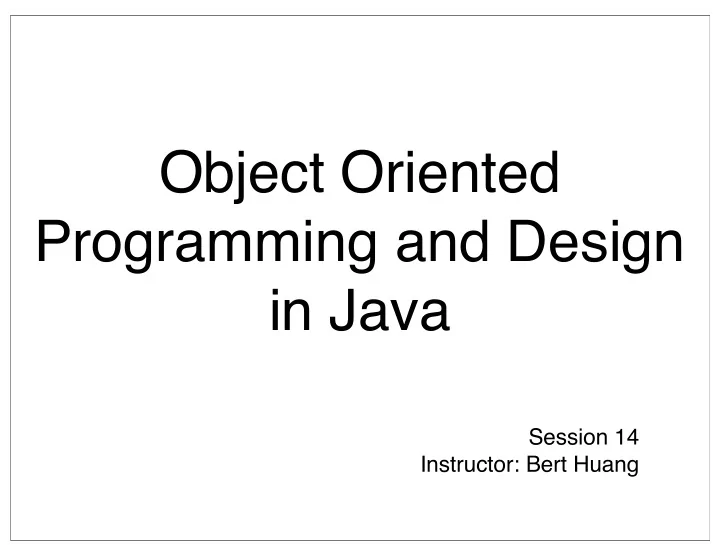

Object Oriented Programming and Design in Java Session 14 Instructor: Bert Huang
Announcements • Homework 3 out. Due Monday , Apr. 5 th • Midterm solutions and grades posted • Office hour change Sun Mon Tue Wed Thu Fri John 1-3 Class Class Lauren 11-12:15 11-12:15 11-1 Bert 2-4 Yipeng 4-6
Review • Returned midterm • Statistics, common mistakes • Cloneable • Serializable • Reflection • Class, Method, Field objects
Today ʼ s Plan • Generics • Generic types • Generic methods • Type bounds and wildcards • Type erasure
Tradeoffs • With more powerful tools, more work is necessary to ensure programs are robust and stable • We saw extreme power in reflection, in that it allows very general code • makes types less restrictive; we can handle them dynamically at runtime • but code using reflection can be hard to maintain
Machine Language Freedom (Power) Reflection Generics Vanilla Java Work (Responsibility)
Old-Fashioned Generics • public class ArrayList { void add(Object obj) { ... } Object get(int index) { ... } } • Any Object subclass works • Runtime exception when typecasting fails • We could use reflection to check all casts
Modern Java Generics • Java since version 5 has allowed generic type placeholders • Write general code, declaring generic classes and methods • Instantiate with actual types for placeholders
Generics We ʼ ve Used • We have used a few generic types from the standard library ArrayList<T> stores objects of type T • • Iterable<T> iterates over objects of type T • or implicitly with enhanced for loop for (Shape s : Model)
Generic Types • Declared with a generic placeholder • public class Box<T> { ... } • Box<String> b = new Box<String>(); • Box<Integer> b = new Box<Integer>(); • public class Pair<T,U> { ... } • Pair<String, Date> p = new Pair<String, Date>();
Generic Methods • We can use generic types in methods, which get resolved dynamically when the method is called public static <E> void fill(ArrayList<E> a, E value, int count) { for (int i = 0; i < count; i++) a.add(value); } • This checks that the ArrayList and value are of the appropriate type at compile time
Type bounds • Occasionally, generic types are too restrictive public static <E> void append(ArrayList<E> a, ArrayList<E> b, int count) { for (int i = 0; i < count && i < b.size(); i++) a.add(b.get(i)); } • We can use a type bound to relax restrictions public static <E, F extends E> void append(ArrayList<E> a, ArrayList<F> b, int count)
Wildcards • Type bounds still require that the client defines the generic types • Sometimes this is undesirable, so we can use wildcards instead public static <E> void append(ArrayList<E> a, ArrayList<? extends E> b, int count) { for (int i = 0; i < count && i < b.size(); i++) a.add(b.get(i)); }
Type Erasure • After javac checks correct type usage with generics, it strips all types from the code into raw types • The resulting code is similar to old- fashioned “generic” code, using Object variables (or the most general superclass) • This allows compatibility with older code • but unfortunately leads to some limitations
Generics Compilation Process Check types Type erasure Compile code Start program Instantiate variables Code Runtime
Erasure Example public static <E> void fill(ArrayList<E> a, E value, int count) { for (int i = 0; i < count; i++) a.add(value); } also type-erased public static void fill(ArrayList a, Object value, int count) { for (int i = 0; i < count; i++) a.add(value); }
Erasure with Type Bounds public static <E extends Number> double sum(E a, E b, E c) { return a.doubleValue() + b.doubleValue() + c.doubleValue(); } public static double sum(Number a, Number b, Number c) { return a.doubleValue() + b.doubleValue() + c.doubleValue(); }
Erasure with Type Bounds 2 public static <E, F extends E> void append(ArrayList<E> a, ArrayList<F> b, int count) { for (int i = 0; i < count && i < b.size(); i++) a.add(b.get(i)); OK because types } are checked before type-erasure public static void append(ArrayList a, ArrayList b, int count) { for (int i = 0; i < count && i < b.size(); i++) a.add(b.get(i)); }
Compatibility Issues • Generics in Java aren ʼ t perfect • One annoying problem comes because of type erasure: • We can ʼ t create new objects of generic types public <E> void addNew(ArrayList<E> a) { a.add(new E()); } becomes new Object()
Arrays of Generics • Similarly, we cannot create an array of generics • Type erasure doesn ʼ t fully explain why Java disallows this E [] myArray = new E[20]; becomes Object [] myArray = new Object[20]; • One workaround produces a warning E[] myArray = (E []) new Object[20];
Generics Summary • Allows us to write code that doesn ʼ t need to specify types • but requires clients to specify and stick to types • Provides programmers more representation power than just inheritance • but not so much freedom as reflection
Reading • Horstmann Ch. 7.7 • http://java.sun.com/docs/books/tutorial/ java/generics/index.html
Recommend
More recommend